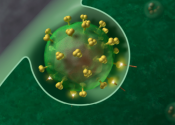Study shows how HIV is shielded from immune attack
Scientists from UNSW Sydney and the UK have discovered that the human immunodeficiency virus (HIV) hijacks a small molecule from the host cell to protect itself from being destroyed by the host's immune system.
Jul 10, 2018
1
56









